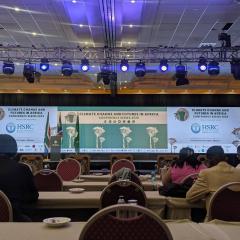
Do Not Underestimate the Power of Local
March 13th, 2019
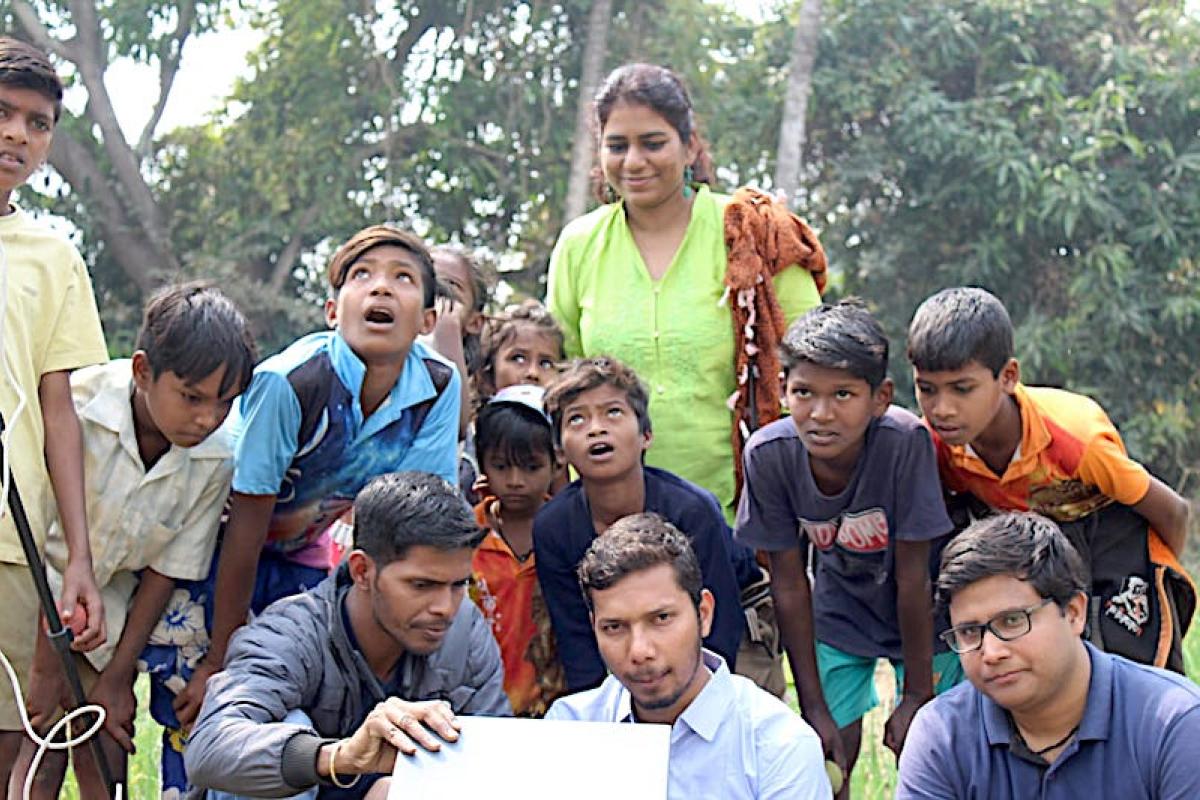
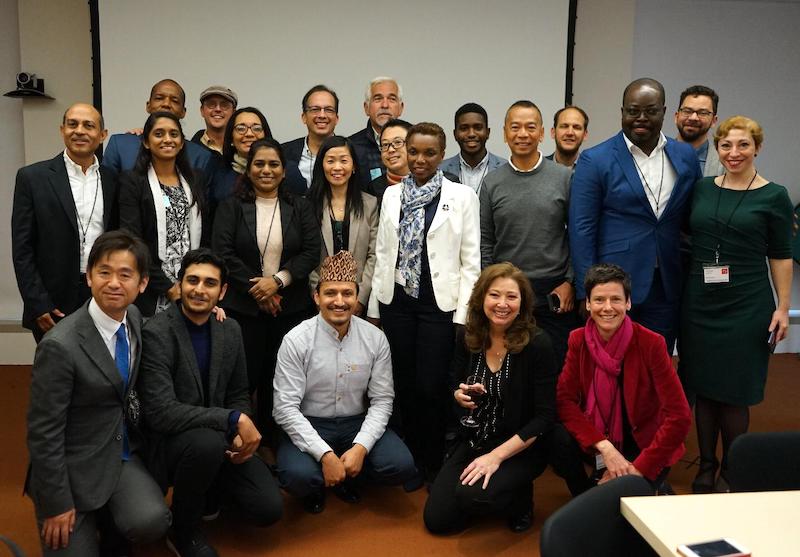 The WeRobotics and Flying Labs teams attending WeRobotics Global 2019 at the Rockefeller Foundation in New York.
The WeRobotics and Flying Labs teams attending WeRobotics Global 2019 at the Rockefeller Foundation in New York.
What happens when you bring Flying Labs leaders from 12 countries in Asia, Africa, Latin America and Oceania together with leading experts in humanitarian aid, search and rescue, public health, sustainable development, robotics, data science, AI and even science fiction? WeRobotics Global happens.
Local leaders and entrepreneurs from Flying Labs in Cote d’Ivoire, Dominican Republic, India, Japan, Nepal, Panama, Peru, Philippines, Senegal, Fiji, Tanzania, Uganda all converged in Brooklyn before WeRobotics Global for the annual Flying Labs retreat, both of which were organized and facilitated by WeRobotics. Having 12 of our Flying Labs network together for the 2-day retreat demonstrated the power of local yet again.
It was remarkable to watch the magic unfold.
India Flying Labs was looking for expertise in agronomy, for example. Cote d’Ivoire said they already had that expertise and were keen to team up with India. Panama presented their autonomous cargo boat project during the retreat, and now Philippines Flying Labs is keen to implement the same project in their country. And on and on for 2 straight days. The retreat also included trainings by WeRobotics on communication and storytelling as well as standard operating procedures, certification, insurance and a lot more.
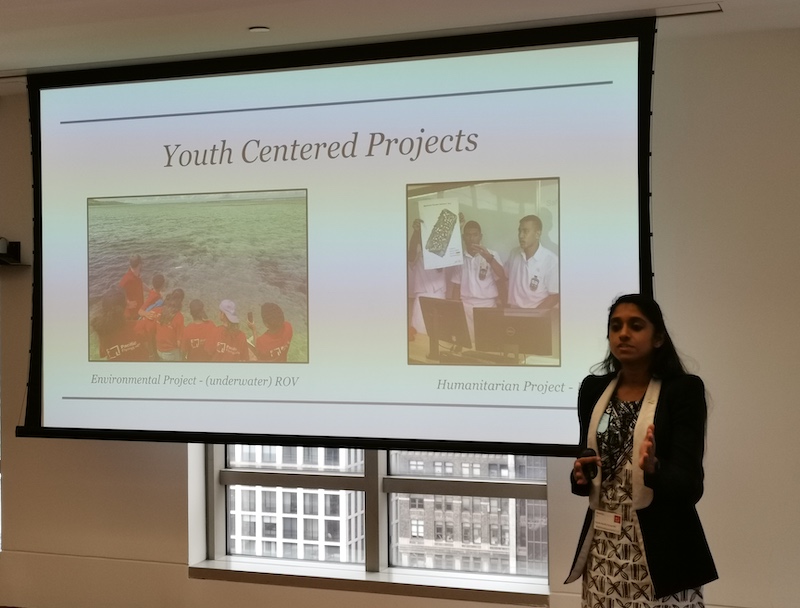 Amrita Lal, South Pacific Flying Labs Coordinator, talks about youth engagement during her presentation.
Amrita Lal, South Pacific Flying Labs Coordinator, talks about youth engagement during her presentation.
The Flying Labs retreat made it abundantly clear that a considerable amount of the expertise and solutions that Flying Labs leaders seek already exists within the network, in-house. Flying Labs are increasingly each other’s best resource. Equally importantly, Flying Labs leaders realized that they each share many strategic interests, such as streamlining flight permissions to ensure that safety and innovation are compatible. While we knew that regulations were already a priority for the 3 Flying Labs that were launched in 2016, knowing now that virtually all 22 Flying Labs around the world share the same strategic interests gives the network more power, which WeRobotics can amplify at the global level.
The Rockefeller Foundation very kindly hosted WeR Global 2019 at their New York venue (learn more about the previous WeR Global event here). WeR Global 2019 brought 45 participants from 22 countries; 23 men, 22 women, and ages ranging from 21 to 63. Patrick Meier, WeRobotics co-founder, gave the opening presentation explaining the power of local and thus the importance of a diverse and inclusive network like the Flying Labs.
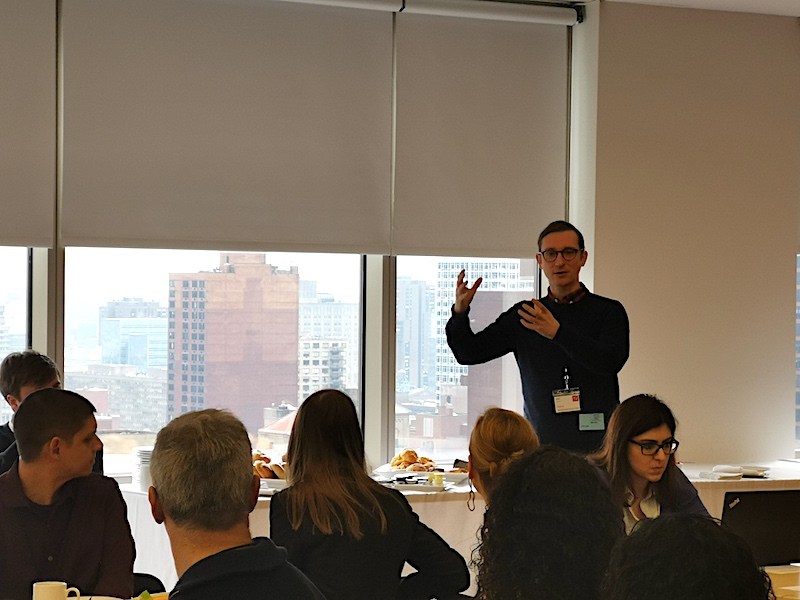 Jake Porway, founder at DataKind, discussing AI and ethics during a Q&A at the end of the second session.
Jake Porway, founder at DataKind, discussing AI and ethics during a Q&A at the end of the second session.
The first panel comprised short presentations from all 12 of the Flying Labs represented at Global, followed by an engaging hour-long Q&A session. The second panel focused on Drones, Data and Ethical AI. Jackie Dujmovic from Hover UAV spoke about the practical, low-cost solutions for shark detection in Australia. She was followed by Jawoo Coo from IFPRI who spoke about the advances in aerial robotics and ethical AI for the social sector. Next, Frank de Morsier from Picterra demonstrated the use of the Picterra platform, which significantly simplifies the use of machine learning for automated feature detection. Jake Porway from DataKind concluded the panel with a talk on the democratization of data science. The discussions that followed focused extensively on AI ethics and shared values. Flying Labs leaders were actively engaged in these discussions.
The third panel focused on the latest lessons learned from medical cargo drone projects. Timothy Amukele from John Hopkins University kicked off the panel, focusing on the public health needs and current costs of traditional delivery methods. Kate Retzki followed with a talk on the use of drones for dengue reduction, a joint project with WeRobotics and South Pacific Flying Labs. Jesse McKinney from Stony Brook University spoke about the use of drones to transport patient samples in Madagascar and soon in Nepal. Last but not least, Anshul Sharma from Redwing, an Indian startup, presented their approach to cargo drones and shared the work they just completed in Papua New Guinea with the Center for Disease Control (CDC), WeRobotics and Papua New Guinea Flying Labs. The rich, open discussions that followed included questions around sustainable cargo drone models, which many Flying Labs weighed in on.
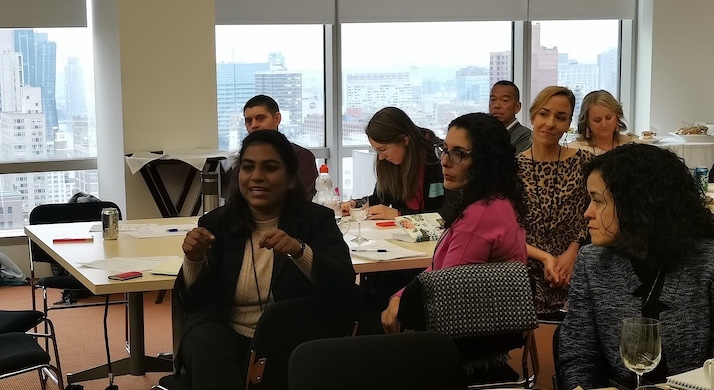 Dr. Ruchi Saxena, Director at India Flying Labs, explains the challenges around the use of robotics for public health in a Q&A.
Dr. Ruchi Saxena, Director at India Flying Labs, explains the challenges around the use of robotics for public health in a Q&A.
The fourth and final panel went beyond aerial robotics. Erin Kennedy from Robot Missions spoke about the use of terrestrial robotics for beach clean-ups and her experience working with youth in this context. You Wu from WatchTower Robotics presented his start-up’s work on identifying water leaks using a swimming robot. Nada Sukkarieh from the Australian Center for Field Robotics presented her group’s work on Digital Farmhand, autonomous tractors that enable precision agriculture. Anne Miglarese from the Radiant Earth Foundation concluded the panel with a presentation on her team’s work in democratizing access to satellite imagery and integrated analysis with aerial imagery.
Celebrated science fiction author Malka Older kindly gave the closing keynote, bringing her expertise in science fiction and particularly the role of technology in science fiction. Malka has previously worked in humanitarian aid and development, and so brought that experience to her keynote. Her superb talk generated a long and engaging follow up discussion with Flying Labs and other participants.
We’ve launched this site to document how we shift power back to local experts. We’ll use it to share the model we’re co-creating and co-implementing with Flying Labs in ~30 countries. We’ll also report on our progress, learnings, and mistakes.
Recent Articles

